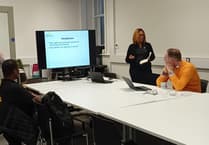ABERGAVENNY Friends of the Earth is making another urgent appeal, in the hope to save the planet.
Our planet, and all life on it are facing climate change, biodiversity loss and pollution. All three issues are linked, all three need to be tackled to avoid irreversible damage to our home. A spokesperson from Friends of the Earth said: “We are already at 1.1 degree of planet warming. We are currently heading towards 2.6 degrees. If we don’t meet the targets set by global climate agreements we could reach 4 degrees! Scientists have told us 1.5 degrees is a safe limit, beyond that will mean significant changes to our weather and our sea levels, and life as we know it.”
In response to this, Friends of the Earth offer simple steps - a list of actions we can all take to reduce our individual impact on the planet and live more sustainably. “A third of our carbon footprint is down to our own choices, so we can (and should) all do our bit. Some steps might seem too hard, some you might be doing already. Please do whatever is applicable to your life and family. Any action is better than nothing.”
Get Cosy:
The first step should be familiar to us all. Saving energy around the home. Energy use in the home accounts for 14 per cent of UK emissions and UK homes are the most poorly insulated in Europe. There are many ways that you can try to save energy, too many to list here. Have a look at the website energysavingtrust.org.uk for loads of advice.
Insulating buildings is vitally important to save energy. Measures like installing cavity wall insulation could help reduce your bills by up to 20 per cent and reduce your emissions by more than half. Any insulation you invest in now will pay you back in energy savings in a few years. 15 per cent of the heat is lost through drafts. If you can’t afford the initial investment the Welsh government has a scheme called Nest/Nyth. The scheme offers a range of free, impartial advice and, if you are eligible, a package of free home energy efficiency improvements such as a new boiler, central heating, insulation, or solar panels. This can lower your energy bills and benefit your health and well-being. You could be eligible for free home energy efficiency improvements if you meet all three conditions below:
• You own or privately rent your home (not from a local authority or housing association)
• Your home is energy inefficient and expensive to heat
• You or someone you live with receives a means tested benefit OR has a chronic respiratory, circulatory or mental health condition and an income below the defined thresholds See nest.gov.wales for more information.
If you have a newly built home don’t assume it is efficient. According to Greenpeace “One of the reasons the UK uses so much gas is that, as well as having one of the oldest, most inefficient housing stocks in Europe, we’re also failing miserably at building better homes – just 1.8 per cent of new homes in England meet the top efficiency rating, which means the other 98.2 per cent need more energy to heat.” Before you buy a new home find out how well insulated it is and save yourself a lot of money. Home builders are not going to build their homes with energy efficiency in mind unless buyers demand it.
If you already have a well-insulated home you might want to install solar panels. Your solar panels will probably pay for themselves in around 10 years. And they’ll keep generating heat or electricity for decades. We can’t achieve enough change on our own. We need business and government to act too.
• E-mail your MP to demand that the UK government helps those people who need it now and fixes the UK’s broken energy system for good. See www.warmthiswinter.org.uk for more information and to sign a petition.
• Support local green energy projects
• Ask shops to stop wasting energy by closing doors and turning off lights at night
• Ask your employer to reduce energy use
• Use social media to influence others to use less energy
• Join Friends of the Earth at www.foe.cymru





Comments
This article has no comments yet. Be the first to leave a comment.